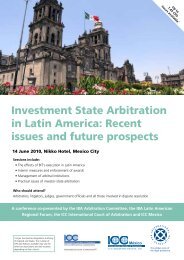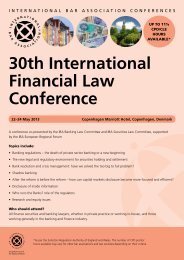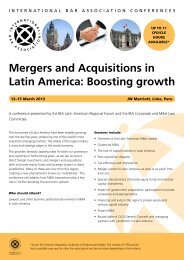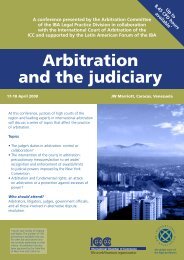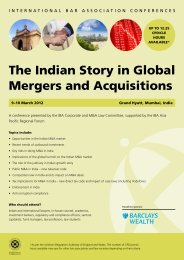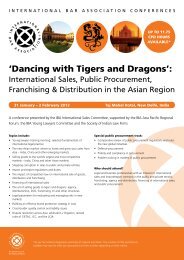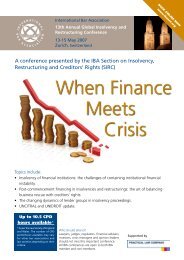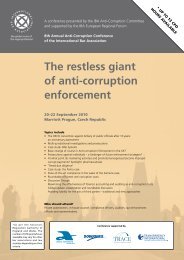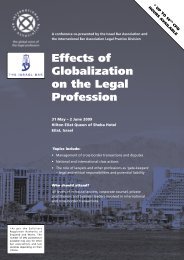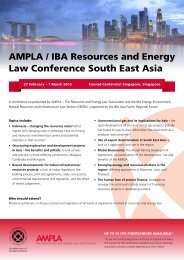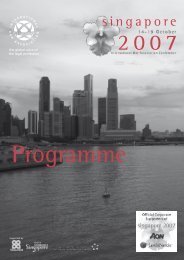Final Programme - International Bar Association
Final Programme - International Bar Association
Final Programme - International Bar Association
Create successful ePaper yourself
Turn your PDF publications into a flip-book with our unique Google optimized e-Paper software.
Speakers<br />
Susan Fay Irish Traveller Movement, Dublin, Ireland<br />
David Joyce The Law Library, Dublin, Ireland<br />
Victor Rodriguez-Rescia <strong>International</strong> expert and consultant on<br />
human rights, San José, Costa Rica<br />
Garth Wallbridge Yellowknife, Northwest Territories, Canada<br />
Coffee and tea breaks will be held between 1100 – 1130 and<br />
1600 – 1630. To accommodate the flow of delegates through<br />
the Conference Centre please note the closest coffee/tea<br />
station to this session is in the Liffey Meeting Room Corridor,<br />
Level 1. Tea and coffee will also be served, during these times,<br />
in The Forum on Ground Level.<br />
Tuesday 1130 – 1230<br />
LIFFEY MEETING ROOM 4, LEVEL 1<br />
News from around the world<br />
Presented by the <strong>International</strong> Franchising Committee.<br />
This session is the traditional round-up of the latest development in<br />
franchising and related matters from jurisdictions around the world.<br />
The focus will be on franchising in Ireland and Africa plus country<br />
updates from audience members.<br />
Moderator<br />
John Baer Greensfelder Hemker & Gale, Chicago, Illinois, USA;<br />
Chair, <strong>International</strong> Franchising Committee<br />
Speakers<br />
Imelda Reynolds Beauchamps Solicitors, Dublin, Ireland<br />
Kendal Tyre Nixon Peabody, Washington DC, USA<br />
Coffee and tea breaks will be held between 1100 – 1130 and<br />
1600 – 1630. To accommodate the flow of delegates through<br />
the Conference Centre please note the closest coffee/tea<br />
stations to this session are in the foyer on Levels 2 and 3.<br />
Tuesday 1230 – 1430<br />
ECOCEM ROOM, LEVEL 2<br />
Open committee business meeting and lunch<br />
Presented by the IBA Global Employment Institute.<br />
An open meeting of the IBA Global Employment Institute will be held<br />
to discuss matters of interest and future activities.<br />
Tuesday 1300 – 1400<br />
FOYER, LEVEL 5<br />
An interview with Juan E Méndez, uN<br />
Special Rapporteur on Torture and Other<br />
Cruel, Inhuman or Degrading Treatment<br />
or Punishment<br />
Moderator<br />
Todd Benjamin Award-winning former CNN news anchor<br />
Juan E Méndez, UN Special Rapporteur on Torture and Other Cruel,<br />
Inhuman or Degrading Treatment or Punishment, has dedicated his legal<br />
career to the defence of human rights and has a long and distinguished<br />
record of advocacy throughout the Americas. He is a Visiting Professor<br />
of Law at the American University – Washington College of Law, and<br />
an adviser on crime prevention to the Prosecutor, <strong>International</strong> Criminal<br />
Court. Until May 2009 he was the President of the <strong>International</strong><br />
Center for Transition Justice (ICTJ) and in the summer of 2009 he was a<br />
Scholar-in-Residence at the Ford Foundation in New York. Concurrent<br />
with his duties at ICTJ, the Honourable Kofi Annan named Mr Méndez<br />
his Special Adviser on the Prevention of Genocide, a task he performed<br />
from 2004 to 2007. For 15 years, he worked with Human Rights<br />
Watch, concentrating his efforts on human rights issues in the western<br />
hemisphere. In 1994, he became general counsel of Human Rights<br />
Watch, with worldwide duties in support of the organisation’s mission,<br />
including responsibility for litigation and standard setting activities.<br />
A national of Argentina, Mr Méndez was himself a victim of torture<br />
and administrative detention during the Argentinian ‘dirty war’. As<br />
a result of his involvement in representing political prisoners, he was<br />
detained by the Argentinian military dictatorship for over a year,<br />
during which time he was adopted as a ‘Prisoner of Conscience’ by<br />
Amnesty <strong>International</strong>. In a conversation regarding this treatment, Mr<br />
Méndez recently told the IBA that ‘it doesn’t go away and, at some<br />
point, you don’t want it to go away because you want it to be a<br />
source of commitment to working on human rights’.<br />
This has been true for Mr Méndez, who continues to fight against<br />
violations of human rights, calling for a victim-centred perspective<br />
in efforts to combat torture and greater progress in institutionalising<br />
basic principles and guidelines to provide minimum standards for<br />
victims. He is a leading voice in the international community against<br />
the use of wrongfully obtained evidence by states, insisting that<br />
evidence compromised by the use of torture should not be deemed an<br />
acceptable tool to gain information and that each state has a duty to<br />
cooperate in the eradication of such practices. These arguments are<br />
particularly relevant to allegations of involvement in torture during the<br />
‘war on terror’ and Mr Méndez has called for an open inquiry in the<br />
UK, recently saying that ‘I’ve seen from my work around the world that<br />
the way to deal with the cancer of torture is to fully root it out with a<br />
wide-ranging, independent and fully public inquiry’.<br />
Tuesday 1430 – 1600<br />
Open committee business meeting<br />
Presented by the Latin American Regional Forum.<br />
AuDITORIuM, LEVEL 3<br />
An open meeting of the Latin American Regional Forum will be held<br />
to discuss matters of interest and future activities.<br />
Tuesday 1430 – 1730<br />
WICKLOW MEETING ROOM 4, LEVEL 2<br />
The rights of the disabled in private<br />
employment and the legal profession:<br />
new international challenges for employers<br />
and employees<br />
Presented by the Discrimination Law Committee and the Disability<br />
Rights Working Group<br />
Companies and employers who fail to provide opportunities to<br />
disabled workers are not only opening themselves to legal challenges<br />
– they are also depriving themselves of the talents of a large segment<br />
of the population. However, employment laws aimed at preventing<br />
discrimination against, and providing accommodations in favor of,<br />
disabled workers, have proceeded in various jurisdictions on tracks<br />
that are not altogether parallel. While all may have made progress in<br />
increasing the focus of the challenges facing disabled workers, to a<br />
greater or lesser extent, they vary widely in their effectiveness.<br />
The legal profession is not immune to the challenges faced by disabled<br />
workers. Lawyers with disabilities often struggle to find work and<br />
acceptance. Law firms, with their traditional models of staffing,<br />
and often concerned by outmoded notions of acceptability and the<br />
Working sessions – Tuesday<br />
91



